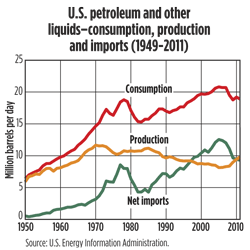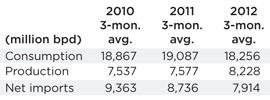Vol. 233 No. 5
OIL AND GAS IN THE CAPITALS
|
DR. ANAS F. ALHAJJI, CONTRIBUTING EDITOR, MIDDLE EAST
|
The U.S. still needs the Middle East
|

|
In a stunning reversal, U.S. oil and natural gas production increased, U.S. oil imports declined (see chart), and the country may end up as a net exporter of natural gas within the next few years. In addition, oil production in Canada is increasing, U.S. dependence on oil imports from Canada is expected to grow, and, once the pipelines are built, Canadian oil could be exported to the rest of the world from U.S. ports along the Gulf of Mexico. These changes in the North American energy landscape will have long-lasting economic and political effects, domestically and globally.
Global economic impact. Lower U.S. oil and gas imports, and future exports of LNG, will affect global trade and, therefore, the global economy in many ways. However, most of the impact is related to investment risk and the value of the dollar. Investment in the U.S. upstream and midstream, in particular, is expected to expand, and will attract domestic and foreign capital. On a risk-adjusted basis, North America will remain the best place in the world for energy investment.
Lower oil and gas imports now, and LNG exports later, should strengthen the U.S. dollar. If the increase in the dollar’s value is large, it will be a sea change, not only in the global oil and gas sectors, but throughout the natural resource industries and various industrial sectors.


|
| Some of the recent reduction in U.S. oil imports can be attributed to sharply lower consumption, prompted by lingering recessionary effects. |
|
Dependence on Middle Eastern oil. Given recent trends of increasing oil production in North America and improvement in efficiency of usage, many experts agree that the U.S. can reduce its dependence on oil imports by about 1.5 MMbpd to 2.0 MMbpd by 2020. This is an amount equal to U.S. imports from the Middle East, about 16% of total oil imports.
Some people have already suggested that the U.S. will be able to eliminate its dependence on oil imports from the Middle East. But will the U.S. do it? The answer is NO. The U.S. will not eliminate its dependence on oil imports from the Middle East, but it might reduce them. In fact, just the use of the term “Middle East” is misleading. While the Middle East encompasses a large number of countries, including some that are “unfriendly” to the U.S., the fact of the matter is that the U.S. imports oil only from three “very friendly” countries: Saudi Arabia (1.2 MMbpd, or about 11% of total oil imports), Iraq (460,000 bpd, or about 4%), and Kuwait (200,000 bpd, or 1.7%).
Oil from Saudi Arabia, Iraq and, to some extent, Kuwait, will continue to flow to the U.S., though at lower levels, because of several economic and strategic factors. These factors include:
- Saudi spare production capacity is needed during crises and to fill the U.S. Strategic Petroleum Reserve (SPR). As long as hurricanes roam the Gulf of Mexico, and turmoil is taking its turn in the oil-producing countries, the U.S. needs this Saudi spare capacity.
- The quality of Iraqi and Kuwaiti crudes is suitable for U.S. refineries.
- The strategic alliances between these countries and the U.S. are significant. It is unlikely that the U.S. will forgo such alliances, just because of an increase in its own domestic oil production.
- From an energy policy viewpoint, import diversity is important for reducing risk of interruptions. Eliminating imports from these countries means more concentration somewhere else.
U.S. presence in the Middle East. If the U.S. eliminates its dependence on Middle Eastern oil imports, or lowers imports significantly, will the country reduce its presence and interest in the region? The answer is, again, NO. There are several economic and strategic reasons that will keep the U.S. in the region:
- The Middle East is not only about oil, and the U.S. has interests other than oil.
- The U.S. wants to prevent Iran from increasing its influence in the region.
- In the post-Sept. 11 world, the U.S. sees its presence in the region as important toward protecting itself.
- Friendly regimes have weak militaries, and they need U.S. protection.
- U.S. presence in the region means that the U.S. can still control oil supplies to China, Europe and others, an advantage the U.S. will not give up.
Conclusions. The U.S. interests in the Middle East do not correlate entirely with oil, although oil plays an important role in U.S.-Middle East relations. The U.S. will continue to import oil from the region, although at a lower level. Lower oil imports do not change the U.S. stand on Middle Eastern issues, especially when it comes to Iran and Israel, and the role of the Gulf countries in the region. 
|
ALHAJJI@ngptrs.com / Dr. Anas Alhajji joined NGP Energy Capital Management, one of the leading energy private equity firms in the industry, in 2008 as Chief Economist. He leads the firm’s macro-analysis of the oil, natural gas and related markets, and the overall economic environment. Before joining NGP, he served as a Professor of Economics at the University of Oklahoma, the Colorado School of Mines and Ohio Northern University.
|
|
|






